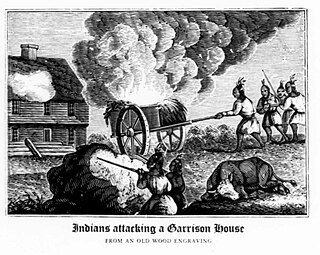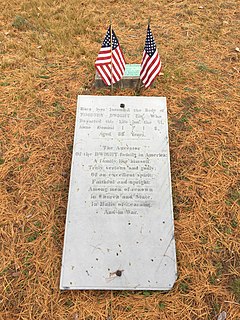Related Research Articles

Fisher Ames was a Representative in the United States Congress from the 1st Congressional District of Massachusetts. He was an important leader of the Federalist Party in the House, and was noted for his oratorical skill.

King Philip's War was an armed conflict in 1675–1676 between indigenous inhabitants of New England and New England colonists and their indigenous allies. The war is named for Metacom, the Wampanoag chief who adopted the name Philip because of the friendly relations between his father Massasoit and the Mayflower Pilgrims. The war continued in the most northern reaches of New England until the signing of the Treaty of Casco Bay on April 12, 1678.
Joshua Bates was an American educator and clergyman. He was the third president of Middlebury College.
The history of Dedham, Massachusetts, 1635–1699, begins with the first settlers' arrival in 1635 and runs to the end of the 17th century. The settlers, who built their village on land the native people called Tiot, incorporated the plantation in 1636. They sought to build a community in which all would live out Christian love in their daily lives, and for a time did, but the Utopian impulse did not last. The system of government they devised was both "a peculiar oligarchy" and a "a most peculiar democracy." Most freemen could participate in Town Meeting, though they soon established a Board of Selectmen. Power and initiative ebbed and flowed between the two bodies.

Nathaniel Ames, a colonial American physician, published a popular series of annual almanacs. He was the son of Nathaniel Ames first (1677–1736) and the father of Nathaniel and Fisher Ames. The family was descended from William Ames of Bruton, Somerset, England, whose son William emigrated to Massachusetts and settled at Braintree as early as 1640.

Deborah Fisher, later Deborah Ames and Deborah Woodward, was a tavern owner in Dedham, Massachusetts.
Ensign Daniel Fisher (1618-1683) was a politician from Dedham, Massachusetts and Speaker of the Massachusetts House of Deputies.
Lieutenant Joshua Fisher was a politician from Dedham, Massachusetts and a member of the Massachusetts House of Deputies. He was a blacksmith, saw mill owner, and tavern keeper.

The First Church and Parish in Dedham is a Unitarian Universalist congregation in Dedham, Massachusetts. It was the 14th church established in Massachusetts. The current minister, Rev. Rali M. Weaver, was called in March 2007, settled in July, and is the first female minister to this congregation.
Nathaniel Ames represented Dedham, Massachusetts in the Great and General Court.

Captain Timothy Dwight (1629–1718) represented Dedham in the Great and General Court of Massachusetts and was the progenitor of the Dwight family.
John Dwight was one of the first settlers of Dedham, Massachusetts and progenitor of the Dwight family.
The history of Dedham, Massachusetts from 1700 to 1799 saw the town become one of the largest and most influential country towns in Massachusetts. As the population grew and residents moved to outlying areas of the town, battles for political power took place. Similar battles were taking place within the churches, as liberal and conservative factions bristled at paying for ministers with whom they had differences of theological opinion. New parishes and preciencts were formed, and eventually several new towns broke away.
Nathan Aldis was an early settler of Dedham, Massachusetts who served on that town's Board of Selectmen in 1641, 1642, and 1644. He served in a variety of other positions in the town and served as a deacon at First Church and Parish in Dedham. He signed the Dedham Covenant.
Nathaniel Whiting was an early settler of Dedham, Massachusetts. He owned several mills on Mother Brook and is said to have dug the canal, the first man-made water way in America.
Pumham was one of Metacomet's chief advisors during King Phillip's War. He was sachem of Shawomet. He was described as "one of the stoutest and most valiant sachems that belonged to the Narragansett." He was friends with English settlers, but aligned himself with Metacomet when war broke out.
Captain Samuel Hunting was a military officer from Massachusetts who served in King Phillip's War.

The Ames Tavern was a tavern in Dedham, Massachusetts. Founded as Fisher's Tavern in 1649 by Joshua Fisher, it eventually passed into the hands of Nathaniel Ames through a complicated lawsuit based on colonial laws of inheritance. It was eventually owned by Richard Woodward, who renamed it the Woodward Tavern by the time the convention that adopted the Suffolk Resolves met there.
This is a timeline of the history of the town of Dedham, Massachusetts.
Josiah Dwight was the minister of the West Parish Church of Dedham, Massachusetts, today Westwood's First Parish, from June 4, 1735, until November 1742.
References
- 1 2 3 4 5 Fisher 1898, p. 41.
- ↑ Fisher 1898, p. 45.
- 1 2 Fisher 1898, p. 43.
- 1 2 3 4 Hanson 1976, p. 121.
- ↑ Bedini, Silvio A. (2003). "The History Corner: Joshua Fisher (1621-1672) Colonial Inn-keeper and Surveyor, Part 1". Professional Surveyor Magazine (September). Retrieved April 17, 2021.
- ↑ Fisher 1898, p. 14.